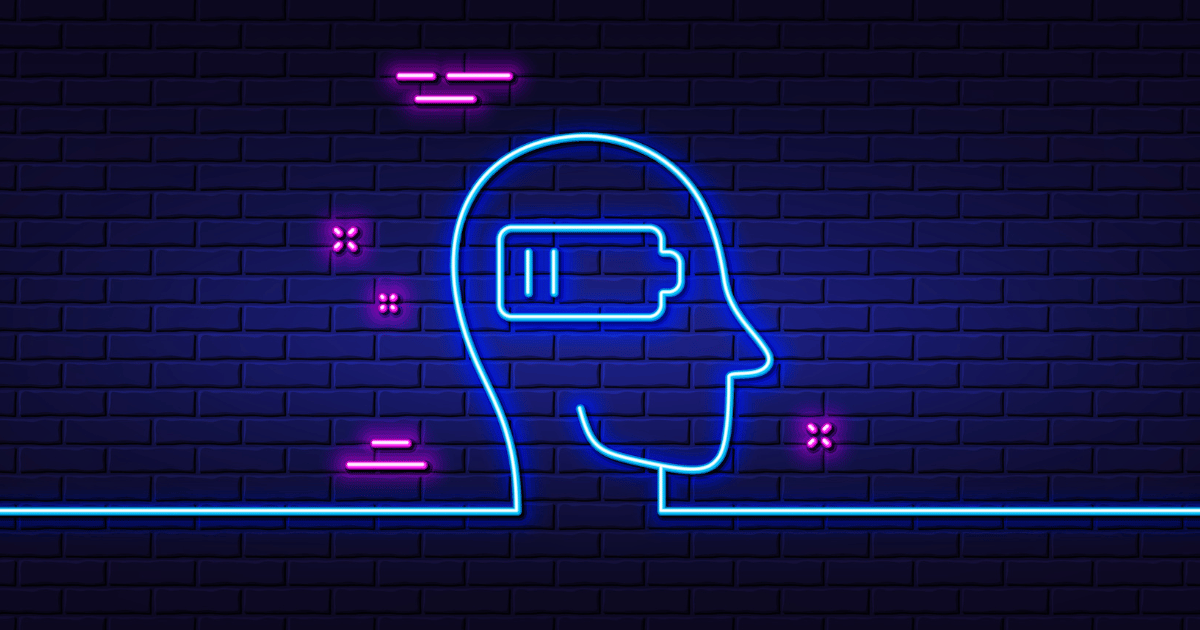Chances are, you're reading this from where you watch tv, eat your dinner, or maybe you're sitting in your "home office" (AKA spare room) taking care of some serious business. You might even be reading this because you're looking for something more "work-like" than unloading the dishwasher but less guilt-inducing than a TikTok rabbit hole.
With no commute or office noise, you have more time for minor distractions, right?
Wait, is that the time… Where has the day gone?
Aaand, now we're in fight or flight mode,
Cranked out on stress hormones, playing catch-up as work bleeds into bedtime...
Oh, hybrid work, what a double-edged sword you are.
As this year's focus for Mental Health Awareness Week is anxiety, we're looking at the common culprit; work. Specifically, hybrid working and the tricky task of maintaining some sort of work/life balance. We find this term a bit misleading (as they're often anything but balanced), so we'll be taking a different approach.
But first, let's talk about anxiety. Everyone feels anxious at times.
Whether it comes in the form of occasional discomfort or living with severe anxiety that impacts your entire life. Both forms can be debilitating when anxiety chooses to strike. The world can be more complicated when you're living with mental health problems.
Today, we're staying in our lane and focusing on what we know - providing solutions that improve performance. Together, let's tackle some everyday bad habits that can impact your anxiety levels and start your day heading down the wrong path. Our resident life coach expert, Kat Thorne, from The Morning Game Changer, shares some top-tips. These are real tips too. They're legit... there's not a scented candle in sight.
According to a recent study by Buffer, remote work can lead to increased job satisfaction, better work-life balance, and reduced stress levels (yay!🤩). Though, the same study also found that remote workers often struggle with isolation, which can lead to decreased motivation and productivity (boo!😢). Confusing much? While remote work has many advantages, it also presents unique mental health and well-being challenges.
One of the biggest issues facing remote workers is the blurring of boundaries between personal and professional life. At home, it's now difficult to separate work from personal time. Thus, increasing anxiety, decreasing productivity and sometimes causing more severe symptoms. A recent study by Monster found 69% of remote workers to be experiencing burnout, compared to 43% of office workers.
Does that mean we all need to rush back into the office?
Not quite. There is no one-size-fits-all answer to whether working from home or in the office is better for mental health. Ultimately, tailor the best approach to individual circumstances and personal preferences. Still, you need structure to maintain a sense of "balance". A code to live and work by. All the coolest kids have a code.
Most people wake up and go straight into autopilot mode. They've not given themselves a chance to mentally or physically prepare for the day ahead. The impact of this over time can be devastating. Therefore, it's essential to cultivate small habits that result in better health, improved performance, and greater happiness. Positive habits = well-being.
We believe that making small, daily changes is the key to hybrid harmony. So it's now time to switch off autopilot and take back control. To help you get started, here is the Founder of the Morning GameChanger (and the resident asembl. life coach) Kat Thorne's 10 top-tips for living a happier, healthier and higher performing life.
📲 Home for your phone
Just because your phone is "mobile" doesn't mean it has to go everywhere. Aside from all that toilet scrolling combined with basically any other activity, it's an icky combo; most people have developed pretty unhealthy phone habits. The saying goes, "everything in moderation", so put it away for improved everything.
⏰ Get up on the first alarm.
Snoozing is like your toxic ex: feels good, but something's wrong. Turns out that it only increases stress and tiredness. You're better than that toxic snooze situation-ship! If you struggle to get up, move your alarm out of reach and get a glass of water when you turn it off.
🥰 Do something that feels good.
We're all guilty of not doing enough to help ourselves start the day in a positive mindset. Just like a brief chat with someone can put you in a good mood, so can a few pages of a great book, a short walk outside, or even just taking a minute to plan your day over a coffee.
🐸 Eat your frog.
By this, we don't mean adding something new to your weeknight menu. Eating your frog is doing your most important task first and generating lasting momentum. Put your phone on Do-Not-Disturb, set a timer (check out the Pomodoro technique) and, in Nike's great words, "JUST DO IT!" It's so easy to put off that important task by starting with your emails and then losing half the day.
💤 Bedtimes.
If you wake up feeling like a small locomotive has hit you, it might be time to look at the clock. Just 1 hour of extra sleep can hugely increase energy, positivity and focus. Setting a regular bedtime will help you achieve this and fall asleep easier. Yes, bedtimes are for adults too.
🧘♀️ Focus on what you can control.
Write in one column all the things on your mind you can't control; in another, write the things you can control. You'll instantly feel less stressed. And you can now focus on the things you can do something about. Pick one and add a first step to your daily habits.
🤖 Automate what you can.
Make your life simpler. It's easy to waste a lot of time on repetitive tasks that you can easily automate. A perfect example of this is mealtimes, whether bulk meal prepping, subscription boxes or online food shopping.
👏 Swap bad for good.
Setting new habits feels simple, but it can be challenging. Get started by swapping out a bad one for a good one. Instead of scrolling in bed, read a few pages of something instead. This is a stress buster, brain booster and sleep inducer, meaning more morning energy. (Now, that's a Brucie Bonus!)
🧠 Feed your brain positivity.
Did you know you can boost your mood by smiling? Feeding your brain wholesome, positive content (whether books, podcasts or videos) will do that x1000! Consider what information you are proactively feeding your brain and recognise the links between your mood, energy and mindset.
❤️🩹 Aim for 80% consistency.
Remember, you're only human. We all have days that don't go according to plan. Don't be harsh on yourself. The trick is to keep reminding yourself how good you will feel after completing one of your new small habits.
We hope you find some of these top-tips helpful on your journey to managing a healthy and positive work/life balance. It can't be all work, and no play... or no rest. Life is there for living and to be enjoyed.
Have you got some wise words of wisdom you'd like to share? We'd love to hear them! Start the conversation and send us a DM: HERE.
Kat spent 10+ years in the roles of Director and CEO. In 2016, she suffered extreme burnout and a life breakdown due to unhealthy habits. She rebuilt her life by introducing a morning routine and a series of positive habits. Learning from her personal journey, Kat is now a positive habits international speaker and teacher working with organisations worldwide to enable their employees to be happier, healthier and higher performing at work and home.
Written by: Christian Apthorpe and Kat Thorne




.png?width=1024&height=640&name=The%20power%20of%20Events%20Supporter%20(1).png)




